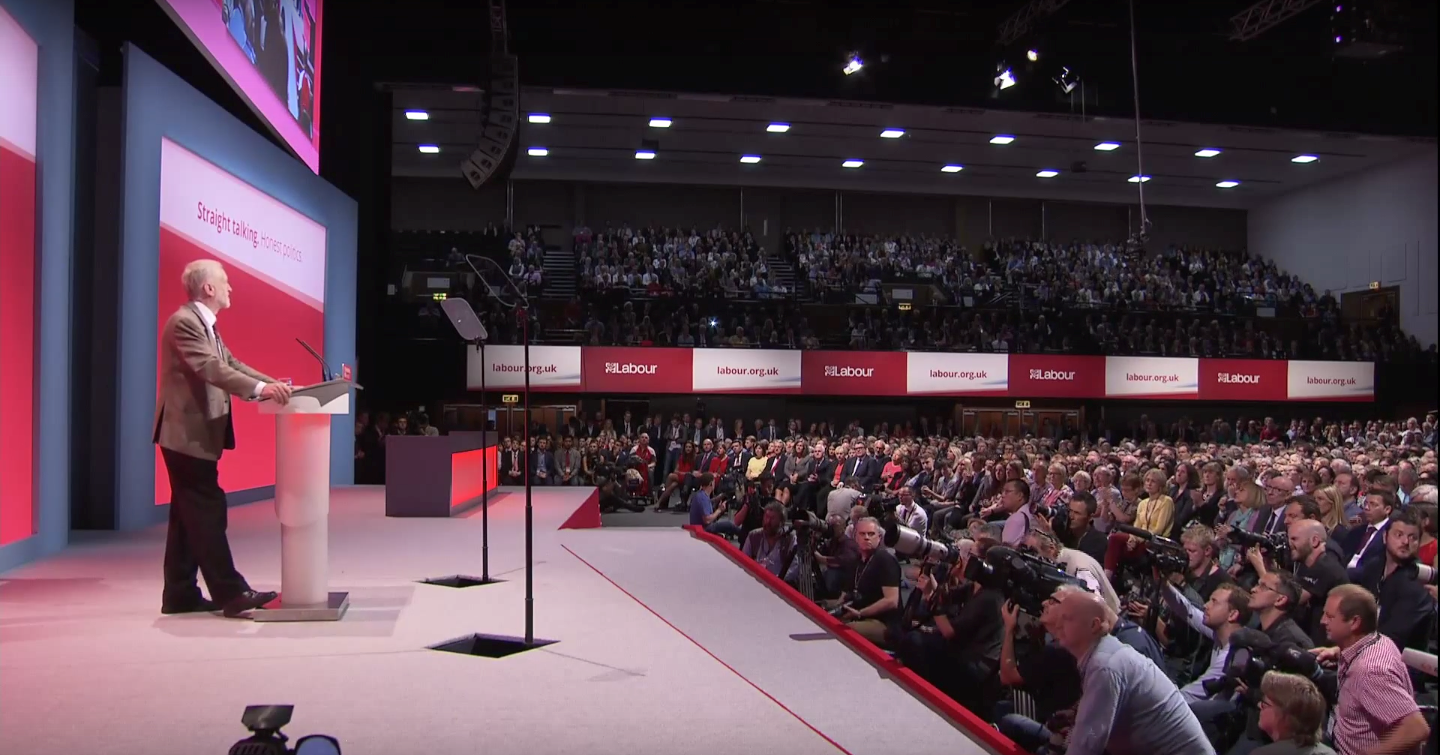Mike Macnair explains why NEC concessions to the JLM will only serve to whet the right’s appetite
(this article first appeared in the Weekly Worker)
The front page headline in the Daily Mail of September 26 was “Labour is the real nasty party”. One might imagine that the story was about Labour advocating stamping on some section of the downtrodden poor. But no. Surprise, surprise – Labour is “the nasty party” because it refuses to suppress anti-Zionist speech, and, indeed, (shock, horror!) delegates have even applauded such speech. The Mail calls this an “outbreak of intimidation and anti-Semitism at its annual conference”.
The Daily Telegraph had the same story, with a bit more elaboration, under the headline, ‘Labour activists compare Israel to Nazi Germany, as Jeremy Corbyn accused of behaving like “ostrich” over anti-Semitism’. The trigger for the story was the Monday fringe meeting called by Free Speech on Israel.
Canned denunciations were provided to the Mail by former Tory minister Andrew Percy and by Labour MPs John Cryer (chair of the Parliamentary Labour Party), Wes Streeting, and John Mann. In addition, the Mail linked the issue to the (actually old) story of trolls’ threats to Laura Kuenssberg in relation to BBC bias in the run-up to the general election, with quotes on this issue provided by MPs Harriet Harman and Jess Phillips.
The Mail tells us that:
A Labour spokesman last night said Mr Corbyn was now tightening up the rules on those who make anti-Semitic comments. He said the party “condemns anti-Semitism in the strongest possible terms” and “will not tolerate holocaust denial”.
The reference is to a rule change agreed to go to conference by the national executive committee, which will change the present rules to allow certain sorts of ‘expression of opinion’ to be the basis of expulsions.
In the Telegraph, the Mail’s ‘amalgam’ (smear by combining unrelated issues) with trolls threatening Kuenssberg is not repeated. But, as well as very similar quotes to those in the Mail from Wes Streeting, John Cryer and John Mann, denunciations in the Telegraph are also provided by shadow health secretary Jonathan Ashworth MP, Jeremy Newmark of Poale Zion (which misappropriated the name ‘Jewish Labour Movement’ in 2004) and Jennifer Gerber of Labour Friends of Israel.
By September 27 the story had spread into other news outlets, notably The Times,which spread a headline on the point across the two pages of its Labour conference coverage and added a leader demanding that “Jeremy Corbyn must at last declare himself on the side of Israel and British Jews” – a very revealing word order: this campaign is about demanding support for Israel – and for “British Jews” only insofar as they support Israel. In the same day’s coverage in the Times and elsewhere Labour Party Marxists is targeted for publishing articles by Jewish anti-Zionists which called into question the factual basis of the complaints against Ken Livingstone.
In other words, the ‘weaponisation’ by the rightwing press and the Labour right of the false and defamatory claim that anti-Zionism amounts to anti-Semitism is persisting in full force. It persists in spite of the ‘unity’ talk of all sides in Labour. And it does so in spite of the concessions made to the PZ-JLM claims by Labour’s national executive committee, which have not defanged the argument. If anything, the NEC’s fudge on the issue is poisoned: it is at risk of conceding the substance of the PZ-JLM claims under cover of superficially neutral language.
To understand why this is so involves understanding both the traps – Scylla and Charybdis – posed by the PZ-JLM’s and the NEC’s (different) proposed rule changes: the problem of the tension of freedom of speech and freedom of association and disassociation. And it involves understanding how these specifically play out in the character of the Labour Party – which is not a ‘normal’ political party, but one which is founded on two contradictory claims, driving a permanent tendency to witch-hunting. The ‘anti-Semitism scandal’ is merely the most recent iteration of ‘bans and proscriptions’ in the interest of the British state security apparat.
Fudge
The issue is about changing the rules – under PZ-JLM’s proposal, in order to get rid of Livingstone and to proscribe anti-Zionist speech. The current relevant rule is in Labour Party rulebook 2016, chapter 2 (‘Membership rules’), clause I, rule 8. It reads:
No member of the party shall engage in conduct which in the opinion of the NEC is prejudicial, or in any act which in the opinion of the NEC is grossly detrimental to the party. Any dispute as to whether a member is in breach of the provisions of this subclause shall be determined by the NCC [national constitutional committee] in accordance with chapter 1, clause IX above and the disciplinary rules and guidelines in chapter 6 below. Where appropriate the NCC shall have regard to involvement in financial support for the organisation and/or the activities of any organisation declared ineligible for affiliation to the party under chapter 1.II.5 or 3.C above; or to the candidature of the members in opposition to an officially endorsed Labour Party candidate or the support for such candidature. The NCC shall not have regard to the mere holding or expression of beliefs and opinions (emphasis added).
The rule is primarily a part of the system of bans and proscriptions, concerned with excluding supposed Trotskyist infiltrators (without explicitly using the T word). The final sentence, which I have italicised, is the Labour bureaucrats’ concession to the party left’s fear that people might be expelled for merely holding Trot-like views.
The practical significance of this final sentence is that if the party had actually expelled Ken Livingstone on the basis of his comments about Hitler and Zionism, as various pro-Zionist politicians and journalists demanded, it is likely that a court would find that the sentence barred an expulsion.
PZ-JLM proposed:
Add an additional sentence after the first sentence:“A member of the party who uses anti-Semitic, Islamophobic, racist language, sentiments, stereotypes or actions in public, private, online or offline, as determined by the NEC, shall be deemed to have engaged in conduct prejudicial to the party.”
Add at the end of the final sentence after “opinions”:
“… except in instances involving anti-Semitism, Islamophobia or racism”.
Insert new paragraph E:
“Where a member is responsible for a hate incident, being defined as something where the victim or anyone else think it was motivated by hostility or prejudice based on disability, race, religion, transgender identity or sexual orientation, the NEC may have the right to impose the appropriate disciplinary options …
The NEC’s version of the rule change is (so far as relevant) to insert:
The NEC shall take account of any codes of conduct currently in force and shall regard any incident which in their view might reasonably be seen to demonstrate hostility or prejudice based on age; disability; gender reassignment; marriage and civil partnership; pregnancy and maternity; race; religion or belief; sex; or sexual orientation as conduct prejudicial to the party. These shall include but not be limited to incidents motivated by racism, anti-Semitism, Islamophobia or otherwise racist language, sentiments, stereotypes or actions, sexual harassment, bullying or any form of intimidation towards another person on the basis of a protected characteristic, as determined by the NEC, wherever it occurs, as conduct prejudicial to the party.
And to add at the end:
… except in any instance inconsistent with the party’s aims and values, agreed codes of conduct, or involving prejudice towards any protected characteristic.
As Bob Pitt has pointed out,1)https://medium.com/@pitt_bob/did-the-jewish-labour-movement-get-its-way-over-labour-party-rule-changes-df62f8b5a1af. The quotations from the PZ-JLM proposal are taken from the JLM online source comrade Pitt cites there; the NEC proposal from Pitt. it is clear that PZ-JLM has not got all it wants. What it has got, however, is a very considerable watering-down of the commitment in the existing party rules not to expel people on the basis of “the mere holding or expression of beliefs and opinions”. It is this that makes the NEC proposal a fudge.
Free speech
Marxists stand for very broad freedom of speech and communication (I will use ‘speech’ as a shorthand for the broader issue).2) See M Macnair, ‘Marxism and freedom of communication’ Critique Vol 37, pp565-77 (2009). The fundamental underlying reason is that the collective appropriation of the means of production – the cooperative commonwealth – requires democratic decision-making. If access to information is restricted, the controllers of the access have obtained private property in that information. Controls on freedom of speech restrict potential hearers’ access to information in the hands of potential speakers, for the benefit of the gatekeepers.
Moreover, the absence of freedom of communication tends to produce ‘planning irrationalities’ of the sort found in the old Soviet-style regimes: planners are led to take decisions in the dark as to actual needs; false pretences become the norm, and ‘They pretend to pay us; we pretend to work’.
This argument may appear to apply only to information which is immediately relevant to material production. But this is untrue. It applies with equal force to such intangibles as education, or to artistic production (remember the artificial resource preference given to ‘socialist realism’). Hence, it is not possible to draw a clear line, which would say ‘We need freedom of production-related speech, but not of other speech’.
Below this level of generality, the working class immediately needs freedom of speech and communication in order to organise itself to take decisions for collective action – strikes, and so on, but equally electoral campaigns – democratically. It needs to organise itself democratically because undemocratic decision-making tends to demobilise and atomise the participants.
There are limits, as liberal writers on the issue recognise.3)They often overstate the point. Notoriously, freedom of speech does not authorise or protect the prankster who falsely shouts ‘Fire!’ in a crowded theatre, causing a panic. False statements made in circumstances where it is not easy for the recipient to check and with a view to making a gain or avoiding a loss – frauds - are more or less universally penalised in legal systems.4)An early example is H Badamchi, ‘The meaning of “theft” in ancient near eastern law’ Folia Orientalia Vol 53, pp369-86 (2016). ‘I’m going to kill you’, said in a realistically threatening manner face to face, justifies the hearer in using deadly force in self-defence.
Beyond such cases, speech may be hurtful (for example, in the context of rows in sexual or family relationships); or defamatory, as a smear tactic; or (particularly when used by a superior to a subordinate, or a majority member to a minority member or dissident) belittling as a form of bullying. And so on.
In these areas Marxists are generally opposed to state/legal regulation of speech; but support the right to challenge speech. The reason is not that we endorse the use of speech to hurt people, defame them or belittle them, and so on. It is that the nature of the state is such that it can be routinely expected to abuse speech control powers given to it. A few examples: section 5 of the Public Order Act 1936, supposedly directed against Oswald Mosley’s British Union of Fascists, was from the outset used mainly against leftwing protestors, trade union pickets, and so on. The first person convicted of incitement to racial hatred was a black power activist. A Canadian reform of pornography law along feminist lines produced as the first item prosecuted under the new law a lesbian magazine. These are merely examples of normal state behaviour.
The theoretical point of libel law is to repress the sort of campaign of defamation which is being run by LFI and PZ-JLM and their MP supporters and media friends. But it would be useless to sue. This is, first, because recent British monarchs have franchised to the bar and solicitors’ profession the sale of justice contrary to Magna Carta article 29, through the ‘free market in legal services’, under which deep pockets routinely win lawsuits – and especially so in defamation cases. It is, second, because this campaign of defamation is in fact being conducted in the interest of the British state and its foreign policy, so that judicial bias in favour of the libellers is to be expected.
The case of a workers’ state would not be different. Empirically, witness, in practice, all the Stalinist regimes, including the most ‘liberal’ ones. Witness also the use of speech controls by the trade union bureaucracy – as, for example, in the ‘Unison monkey trial’. Theoretically, the permanent bureaucratic apparatus of a trade union, or of a workers’ state, is a form required by the limits of the transition to communism: a persistence of ‘bourgeois right’; and the individual state or bureaucratic officials have particular interests in their individual posts and their bureaucratic ‘turf’ – as Marx pointed out in his Critique of Hegel’s philosophy of right. These interests motivate the abuse of speech controls, which is found empirically.
From this point of view, the statement that “The NCC shall not have regard to the mere holding or expression of beliefs and opinions” is a desirable rule, and diluting it is straightforwardly a bad idea. But matters are not quite so simple.
Freedom of association
The Labour Party is not a state. It is, in a certain aspect, an agency of the United Kingdom state – a point to which we will return later. But basically it is a political party: a voluntary association whose aim is to pursue certain political aims, mainly through persuading other people to support these aims (for instance, by electing Labour representatives into office).
This does not make free speech irrelevant to the Labour Party (or any other political party). But it does mean that it has certain limits. If the Labour Party routinely tolerated prominent figures who called for people to vote Tory – or, for that matter, for the party to adopt Tory policies – it would render itself completely nugatory.
But, of course, it does. We argued in this paper in 2010 for the expulsion of the Labour figures who took jobs from the Con-Dem coalition government: Frank Field, John Hutton and Alan Milburn.5)‘Expel the collaborators’ Weekly Worker August 25 2010. No wider forces took up this call.
The Blairites were, in essence, advocates of Labour adopting a great deal of Tory policy. During their ascendancy the party really was tending towards becoming a political zero as a result, meaning merely an office-gaining machine for careerists; but in doing so it actually paved the way for actual electoral failure, as happened in Scotland in 2015. If the Blairites had retained control, Theresa May might have succeeded in her project in the June election of winning the Labour Brexiteer votes and thus completing the job of smashing Labour started in Scotland.
It is thus perfectly legitimate to say that people who want to campaign for conservatism should openly and honestly join the Conservative Party, rather than covertly do so in the Labour Party. And in that sense the ‘absolute’ guarantee of freedom of “expression of beliefs and opinions” in the party rules as they stand is inappropriate. If the left defends this absolute guarantee unequivocally, it will actually be preparing the ground for pro-Tory advocates in the future.
There is also an issue which is closer to the immediate one. Feminism, anti-racism and various other ‘special oppression’ issues have since the 1990s been ‘weaponised’ in the interests of US foreign policy. That does not mean, however, that the left should abandon opposition to racism, patriarchy, and so on. In the words of the 1880 Programme of the Parti Ouvrier, “The emancipation of the productive class is that of all human beings without distinction of sex or race” – and the same goes for all the other distinctions which have been made the ground of oppression.
Hence, conducting a racist agitation, for example, is agitating against Labour’s – or Marxist – aims and values. It again poses the point that the honest racist should go and join an openly racist party rather than attaching themselves to the left.6)I do not mean by this to deny the undoubted history of racist commitments of the labour movement. An example from the 1906 Labour manifesto: “Chinese Labour is defended because it enriches the mine owners” (http://labourmanifesto.com/1906/1906-labour-manifesto.shtml). This does not alter the point that Marxism has a historical commitment against racism and sexism.
Getting closer still. The Zionists have argued that anti-Zionism – opposition to the project of creating a state for all the world’s Jews in the Levant – in itself amounts to anti-Semitism. This is straightforwardly false. Nonetheless, there is such a thing as an anti-Semitic anti-Zionism. It is found where, instead of blaming the political Zionist movement, and the policies of the great powers, for the creation of the state of Israel and its ongoing colonial oppression and dispossession of the local inhabitants, an attempt is made to find some way of blaming these events on the Jews as such, or on specifically ‘Jewish’ capital.
This newspaper has encountered the phenomenon directly in the fairly recent past. In September 2014 we reported the expulsion of Ian Donovan from the Communist Platform of Left Unity, precisely because the overwhelming majority of members wanted Communist Platform to dissociate itself publicly from Donovan’s arguments that the United States backs the state of Israel because of the large number and influence of specifically Jewish capitalists in the US.7)‘No place for anti-Semitism’ Weekly Worker September 18 2014.
Suppose, then, that the Labour Party was a regular political party, which had unambiguous general anti-racist commitments in its platform. We would then support in principle the use of party disciplinary procedures to dissociate the party from people who argued that “Jews” as such or “Jewish capital” as such are responsible for the state of Israel and/or its conduct.
At present, however, to take this approach would involve obvious double standards. The reason is that the state of Israel is explicitly and by its constitution a racialist state: a state for its Jewish citizens, not one for all its citizens, and still less one for all its subjects, which include the Palestinian inhabitants of the West Bank and Gaza, who are subject to Israeli military occupation and expropriations to facilitate colonisation (West Bank) and siege warfare (Gaza).
Hence PZ-JLM and LFI, by promoting Labour support for Israel without explicitly condemning the racialist provisions in Israel’s constitution and the racialist conduct of the Israeli state in (at least) the West Bank, are actively promoting racism. Yet the party takes no action against this activity. Indeed, any suggestion that PZ-JLM should be disaffiliated is denounced as … anti-Semitism, and therefore racism.
Under these circumstances, even to proceed to take disciplinary measures against people who argued that “Jews” as such or “Jewish capital” as such are responsible for the state of Israel, while leaving the advocates of support for Israel in its present racist form untouched, would be double standards.
This, of course, is not what the Labour right’s MPs, PZ-JLM, LFI and the rightwing media are demanding. They are claiming that not supporting Israel is anti-Semitism and racism. This is not merely double standards, but a big lie: “Leon Trotsky was a fascist, and I know it for a fact: first I said it, then I read it, in the Hitler-Stalin pact.”
What drives this big lie machine? It might be imagined (and, it seems, probably is imagined among the Labour left) that it is merely a matter of securing a Conservative victory at the next general election by smearing Labour. An assumption of this sort is likely to have led to the idea of defanging the smear campaign by concessions to it, which explains the NEC decision on the rule change proposal and the responses of Labour officials to the media on the issue. If so, the concessions would lead to inability to exploit the issue, leading in turn to it fading out of public attention.
But this is not what has happened. And in reality, the agenda is something different. It is about who controls the Labour Party, given the risk that Labour might form a government.
Labour
The Labour Party is not (to quote my formulation above) “a regular political party, which has unambiguous general anti-racist commitments in its platform”. Rather, it is a party founded on a contradiction.
On the one hand, Labour claims, both by its name and by its affiliate structure, to be not a party founded on a specific political platform, but rather the united representative of the working class as a whole. In this character, it blocks the legitimacy of the existence of alternative parties within the movement. (I emphasise ‘legitimacy’ because it is the first-past-the-post electoral system which is the primary obstacle to the electoral representation of alternative parties.)
On the other hand, in contradiction with this claim, Labour is characterised by commitments, not explicit in its constitution, to loyalty to the British constitution and to the British national interest. Though these are not explicit political commitments in the party’s constitution, they extend way to the left of the centre ground, and can be found even among advocates of constitutional reform: Michael Foot at his most leftwing was still a loyalist to the constitution; Tony Benn advocated radical constitutional change, but still within a British framework (the restoration, in a sense, of the Commonwealth of 1651-54), and Brexiteering.
None of this is any novelty in Labour. It was already present before World War I in the PLP’s tailing the Liberals on international politics and in Labour’s support for the war.
Its primary institutional expression is, precisely, the regime of bans and proscriptions. Labour simultaneously claims by its name and its affiliate structure to represent the working class as a whole – but by the bans and proscriptions, it claims to exclude the representation of the part of the working class which is not loyal to the constitution and to the British ‘national interest’ in foreign affairs.
If Labour had open and transparent programmatic commitments to British nationalism and loyalism, it would be hard for it to claim that it represents the working class as a whole, and thus block the legitimacy of any alternative workers’ party, hold on to the system of trade union affiliation, and so on. These commitments must thus take indirect forms; and those forms are bans and proscriptions and witch-hunting, together with the protected privileges of the PLP.
In this aspect, the Labour Party serves as an indirect agency or arm of the British state: it propagates loyalty to the constitution and to the national interest among the working class, and Labour MPs can in principle be trusted to carry out ministerial roles in the interests of the state (and thus, indirectly, of capitals operating on British territory).
Jeremy Corbyn’s victory in two leadership elections, and the Tories’ failure to inflict a crushing defeat on Labour in June 2017, pose a particular problem for this regime. They do so because since 1940 the fundamental orientation of British state policy has been the acceptance of subordinate-ally status in relation to the USA in exchange for protection.
It was not peculiar to Blair to get involved in wars in Afghanistan and Iraq: the Wilson government conducted various counterinsurgency operations, in particular in Yemen and Oman, and backed Vietnam (though it did not actually send in troops); the Attlee government took Britain into the Korean war.8)Before 1940, of course, it was a matter of maintaining British imperial interests: for example, the 1924 MacDonald Labour government continued support for ‘air control’ bombing in Iraq and elsewhere – see JS Corum, ‘The myth of air control: reassessing the history’ Aerospace Power Journalwinter 2000, pp61-77.
There is a particular need to hem in Corbyn, McDonnell and Abbott (and their supporters) on this issue because the Iraq war lacked united backing from the British state core, and consequently gave rise to an enormous, mass anti-war movement, with which Corbyn in particular was closely associated. The anti-war movement itself as an activist movement ebbed away; but it left behind a legacy of scepticism on the left towards US policy in the Middle East and the US’s Israeli sidekick. The Gaza war of 2008-09 (‘Operation Cast Lead’) attracted much more open media and activist hostility than had been the case with previous Israeli operations.
The British state needs to restore the trustworthiness of a potential Labour government in the eyes of the USA. To do that means that Labour has to give explicit commitments to support US policy in the Middle East. This was the point of Cameron’s demands for support for bombing the Syrian state, and then for bombing the Syrian Islamist opposition, and the ridiculous momentary glorification of Hilary Benn in December 2015.
But this direct demand for support has been rather unsuccessful. After all, US policy in the Middle East does not look terribly successful. Almost worse is Cameron’s ostensible lead role, with Labour backing, in causing state failure and humanitarian disaster in Libya in the name of ‘humanitarian intervention’.
It is in this context that the big lie that anti-Zionism equals anti-Semitism has been promoted and continues to be promoted. It takes hold of a vulnerability of the broad left – its intersectionality, its inability to confront identity-oppression claims. By doing so it weaponises the idea of anti-racism.
The ‘Labour’s anti-Semitism problem’ big lie will thus persist until the Labour leadership is prepared to give Israel the blank cheque which will – when the time comes – ‘justify’ bombing Iran and/or again invading Lebanon and/or further ethnic cleansing in the West Bank. It is a merely incidental advantage that it allows further and better ‘compliance unit’ purges of Labour lefts.
Poison
It is in this context that the NEC’s amendment is not merely a fudge, but a poisoned fudge. The idea of the amendment is to make a more general and more limited limitation on free speech than the PZ-JLM proposal. The revised wording will read:
The NCC shall not have regard to the mere holding or expression of beliefs and opinions except in any instance inconsistent with the party’s aims and values, agreed codes of conduct, or involving prejudice towards any protected characteristic.
The idea of a “protected characteristic” is taken from the Equality Act 2010, sections 4-12, listing a range of characteristics – race, age, gender, sexual orientation, religious or philosophical beliefs, etc. Section 13 then prohibits direct discrimination on the ground of the protected characteristics and section 19 indirect discrimination.9)In between sections 13 and 19 is a quantity of complexity posed by the fact that age, sex and disability actually pose different discrimination problems to race and nationality; but that is a problem with the design of the 2010 act, not with the Labour Party’s new rule.
In this statutory context the terminology makes a degree of sense, and so does the term, ‘prejudice’. In origin, ‘prejudice’ refers to the judge (or equivalent) who has made his mind up before hearing the evidence and argument (for whatever reason). In the context of direct discrimination in employment, etc, it also makes sense: the point is that the employer has made his mind up not to hire black people (or whatever) without waiting for the CV or interview.
In the context of penalising the “mere holding or expression of beliefs and opinions”, however, “prejudice” is perfectly meaningless. There is no concrete decision, nor any concrete arguments of evidence, in relation to which there is a pre-judgement.
It can only then be taken to mean something in the nature of “negative attitude to” – so that, for example, radical feminists are ‘prejudiced’ towards trans women, no matter how much argument they offer; or feminists generally are ‘prejudiced’ against Catholic right-to-lifers on the basis of their religious views; or leftwingers are ‘prejudiced’ against the holders of Conservative philosophical beliefs; or anti-Zionists are ‘prejudiced’ against Jews because, it is alleged, all Jews are Zionists; or because Jews are, it is claimed, a nation and all nations have the right to self-determination (except ones targeted as ‘rogue states’ by the USA).
All of these arguments are versions of the same method – of converting disagreement into a supposed violation of someone’s rights. But they all follow logically from the acceptance of the “prejudice” formula, made into an empty ‘boo word’ by taking it out of its proper contexts of judicial misconduct and direct discrimination.
The underlying dynamics of the Labour Party in the present period mean that partial concessions to the smear-mongers will not defang the issue, but they will just come back for more. And the concessions are then a means in which they are helped to come back for more. The fudge is poisoned.
Notes
1. https://medium.com/@pitt_bob/did-the-jewish-labour-movement-get-its-way-over-labour-party-rule-changes-df62f8b5a1af. The quotations from the PZ-JLM proposal are taken from the JLM online source comrade Pitt cites there; the NEC proposal from Pitt.
2. See M Macnair, ‘Marxism and freedom of communication’ Critique Vol 37, pp565-77 (2009).
3. They often overstate the point.
4. An early example is H Badamchi, ‘The meaning of “theft” in ancient near eastern law’ Folia Orientalia Vol 53, pp369-86 (2016).
5. ‘Expel the collaborators’ Weekly Worker August 25 2010.
6. I do not mean by this to deny the undoubted history of racist commitments of the labour movement. An example from the 1906 Labour manifesto: “Chinese Labour is defended because it enriches the mine owners” (http://labourmanifesto.com/1906/1906-labour-manifesto.shtml). This does not alter the point that Marxism has a historical commitment against racism and sexism.
7. ‘No place for anti-Semitism’ Weekly Worker September 18 2014.
8. Before 1940, of course, it was a matter of maintaining British imperial interests: for example, the 1924 MacDonald Labour government continued support for ‘air control’ bombing in Iraq and elsewhere – see JS Corum, ‘The myth of air control: reassessing the history’ Aerospace Power Journalwinter 2000, pp61-77.
9. In between sections 13 and 19 is a quantity of complexity posed by the fact that age, sex and disability actually pose different discrimination problems to race and nationality; but that is a problem with the design of the 2010 act, not with the Labour Party’s new rule.
References
| ↑1 | https://medium.com/@pitt_bob/did-the-jewish-labour-movement-get-its-way-over-labour-party-rule-changes-df62f8b5a1af. The quotations from the PZ-JLM proposal are taken from the JLM online source comrade Pitt cites there; the NEC proposal from Pitt. |
|---|---|
| ↑2 | See M Macnair, ‘Marxism and freedom of communication’ Critique Vol 37, pp565-77 (2009). |
| ↑3 | They often overstate the point. |
| ↑4 | An early example is H Badamchi, ‘The meaning of “theft” in ancient near eastern law’ Folia Orientalia Vol 53, pp369-86 (2016). |
| ↑5 | ‘Expel the collaborators’ Weekly Worker August 25 2010. |
| ↑6 | I do not mean by this to deny the undoubted history of racist commitments of the labour movement. An example from the 1906 Labour manifesto: “Chinese Labour is defended because it enriches the mine owners” (http://labourmanifesto.com/1906/1906-labour-manifesto.shtml). This does not alter the point that Marxism has a historical commitment against racism and sexism. |
| ↑7 | ‘No place for anti-Semitism’ Weekly Worker September 18 2014. |
| ↑8 | Before 1940, of course, it was a matter of maintaining British imperial interests: for example, the 1924 MacDonald Labour government continued support for ‘air control’ bombing in Iraq and elsewhere – see JS Corum, ‘The myth of air control: reassessing the history’ Aerospace Power Journalwinter 2000, pp61-77. |
| ↑9 | In between sections 13 and 19 is a quantity of complexity posed by the fact that age, sex and disability actually pose different discrimination problems to race and nationality; but that is a problem with the design of the 2010 act, not with the Labour Party’s new rule. |

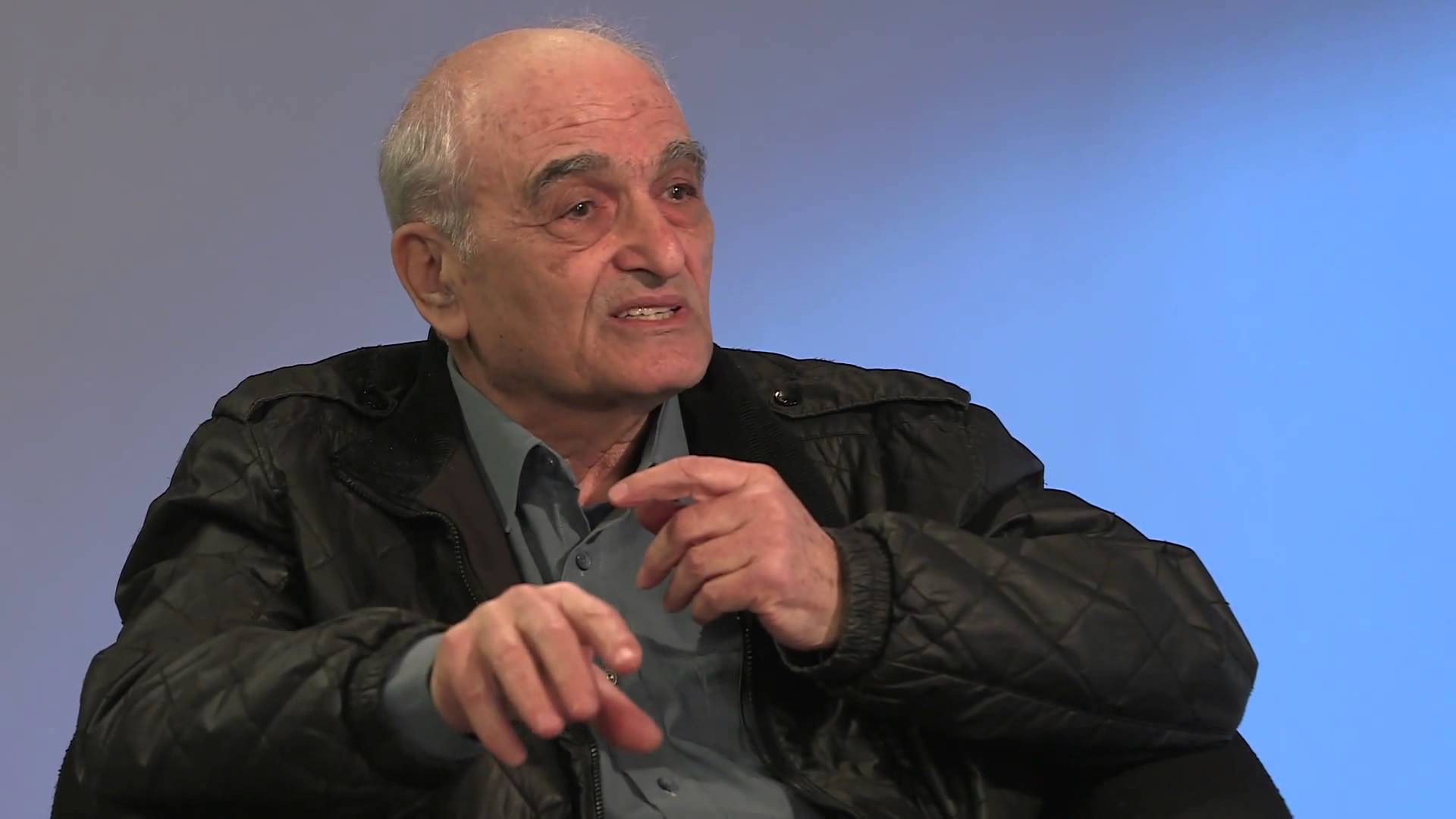
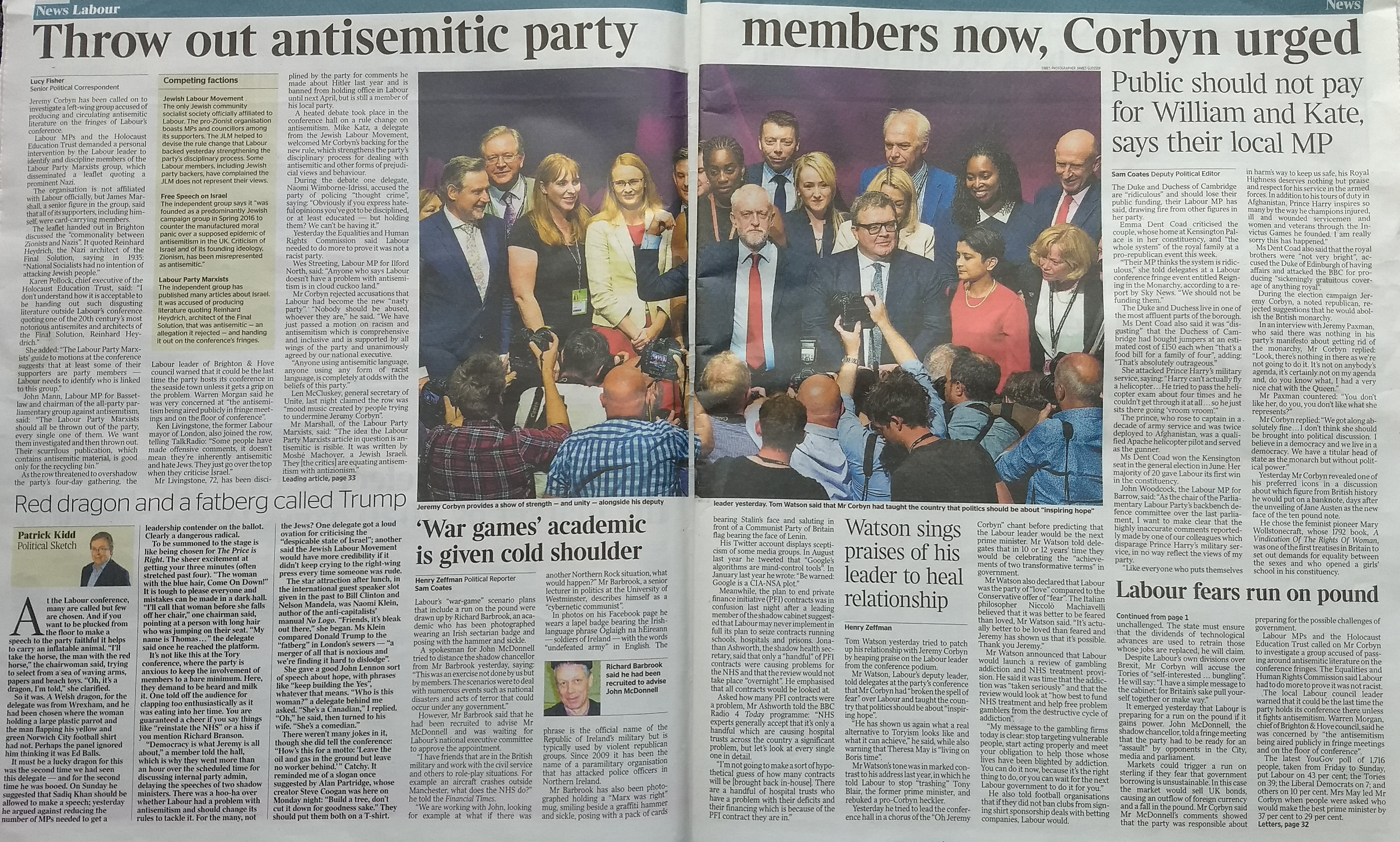
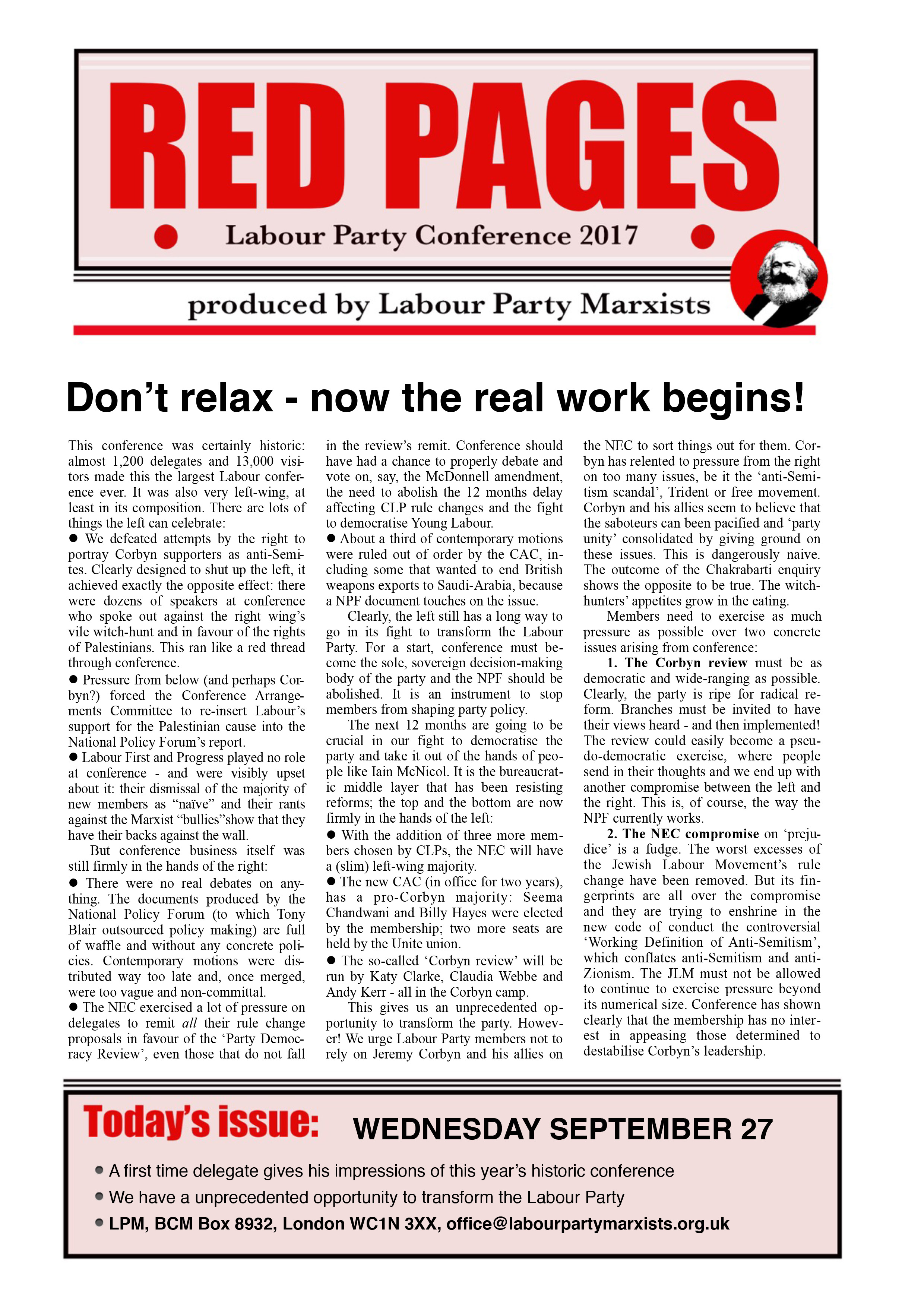
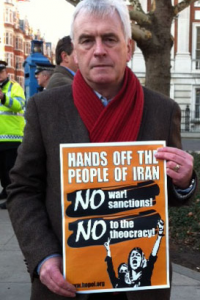 Support trade unionists in Iran!
Support trade unionists in Iran!
